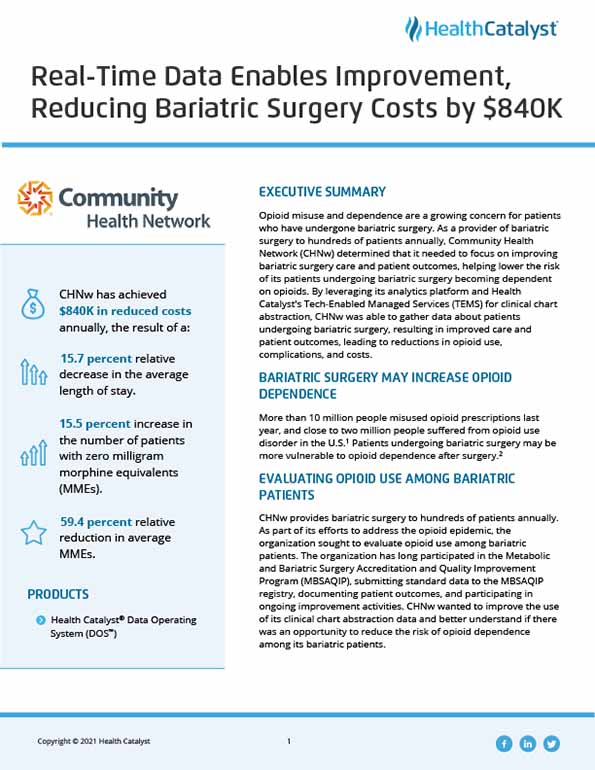Opioid misuse and dependence are a growing concern for patients who have undergone bariatric surgery. As a provider of bariatric surgery to hundreds of patients annually, Community Health Network (CHNw) determined that it needed to focus on improving bariatric surgery care and patient outcomes, helping lower the risk of its patients undergoing bariatric surgery becoming dependent on opioids. By leveraging its analytics platform and Health Catalyst's Tech-Enabled Managed Services (TEMS) for clinical chart abstraction, CHNw was able to gather data about patients undergoing bariatric surgery, resulting in improved care and patient outcomes, leading to reductions in opioid use, complications, and costs.
More than 10 million people misused opioid prescriptions last year, and close to two million people suffered from opioid use disorder in the U.S.1 Patients undergoing bariatric surgery may be more vulnerable to opioid dependence after surgery.2
CHNw provides bariatric surgery to hundreds of patients annually. As part of its efforts to address the opioid epidemic, the organization sought to evaluate opioid use among bariatric patients. The organization has long participated in the Metabolic and Bariatric Surgery Accreditation and Quality Improvement Program (MBSAQIP), submitting standard data to the MBSAQIP registry, documenting patient outcomes, and participating in ongoing improvement activities. CHNw wanted to improve the use of its clinical chart abstraction data and better understand if there was an opportunity to reduce the risk of opioid dependence among its bariatric patients.
CHNw relies upon the Health Catalyst® Data Operating System (DOS™) platform and the TEMS clinical chart abstraction team to collect and submit registry data. The TEMS team gathers more than 100 distinct data points for patients undergoing bariatric surgery at CHNw and submits the information to the registry. CHNw regularly reviews the registry data, gaining insight into performance to support ongoing improvement efforts. In addition, the organization analyzes outcomes data for each patient, and even by surgeon, to identify improvement opportunities that may not have otherwise surfaced.
As part of its ongoing performance improvement activities, CHNw reviewed its bariatric surgery registry data and identified the opportunity to reduce opioid use. As a result, the organization elected to participate in the Bariatric Surgery Targeting Opioid Prescriptions initiative, a nationwide metabolic and bariatric surgery quality improvement collaborative. As part of participating in the improvement program, CHNw added 19 data points to the registry data for its patients undergoing bariatric surgery.
CHNw has standardized workflows and improved processes, resulting in bariatric surgery improvements. Patients undergoing bariatric surgery receive comprehensive preoperative education. The organization uses a standard protocol to ensure patients receive consistent, evidence-based care. The protocol includes specific guidelines for multimodal pain control, regional anesthetic therapy, and limited opioids, including minimized opioid use during the pre-, intra-, and postoperative care phases.
CHNw leverages the data from DOS and the TEMS team to regularly monitor performance. Key insights derived from the data analyses are disseminated to the bariatric surgeons at quarterly meetings. These data-informed providers are then able to further improve upon the bariatric surgery care model.
CHNw has improved its bariatric surgery care and patient outcomes. The organization also achieved a reduction in opioid use, complications, and costs. Results include:
"Leveraging our analytics capabilities and the Tech-Enabled Managed Services partnership with Health Catalyst has enabled the organization to better utilize our registry data for improvement. We were able to reduce bariatric surgery costs by $840K and reduce opioid use."
- Patrick McGill, MD, FAAFP, Executive Vice President, Chief Analytics Officer, Community Health Network
CHNw continues to leverage DOS and the TEMS clinical chart abstraction team to track long-term outcomes for patients undergoing bariatric surgery to ensure sustained quality.


